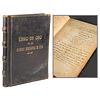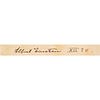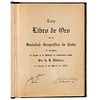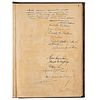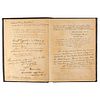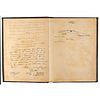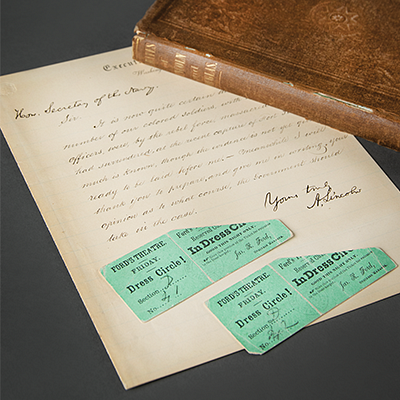Albert Einstein Signed Cuban Geographical Society Guest Book
Two ways to bid:
- Leave a max absentee bid and the platform will bid on your behalf up to your maximum bid during the live auction.
- Bid live during the auction and your bids will be submitted real-time to the auctioneer.
Bid Increments
| Price | Bid Increment |
|---|---|
| $0 | $5 |
| $50 | $10 |
| $200 | $25 |
| $500 | $50 |
About Auction
Sep 23, 2023
RR Auction support@rrauction.com
- Lot Description
Unique leatherbound hardcover 'Golden Book' guestbook of the Cuban Geographical Society, 10.5 x 13.5, signed inside on the first six pages by visiting scientific dignitaries—highlighted by Albert Einstein in December 1930, along with his wife, Elsa Einstein, and his mathematician assistant Walther Mayer, nicknamed 'Einstein's calculator.' Albert Einstein boldly pens a passionate declaration in German (translated): "The first truly universal society was the society of researchers. May the coming generation establish a political and economic society which will insure us against catastrophes."
Among the other signers in the volume are polar explorer Hubert Wilkins and members of his expedition: pilot Carl Ben Eielson, pilot Joe Crosson, and mechanic Orval H. Porter; geologist Albert Perry Brigham; publisher, philanthropist, and aviator Harry F. Guggenheim (signing "on behalf of my distinguished countryman and good friend Richard E. Byrd"); and cartographer Erwin Raisz (who adds a fine sketch of a plane soaring over the island nation). Additionally signed on the title page by Juan Manuel Planas Sainz, a pioneering Spanish-language science fiction writer considered the 'Jules Verne of Cuba,' who was then serving as president of the Sociedad Geografica de Cuba. In very good to fine condition, with scattered foxing, toning, and dampstaining throughout, affecting only appearance and none of the bold handwriting.
In December 1930, Einstein visited Cuba for a day-and-a-half—a jaunt made while en route to San Diego aboard the Belgenland, which stopped in Havana before passing through the Panama Canal. There he received a hero's welcome from the leaders of the Academy of Medical, Physical, and Natural Sciences of Havana, the Geographical Society of Cuba, and the local Jewish community. During his visit, Einstein gave a series of lectures on relativity theory and quantum mechanics at the University of Havana and the National Capitol.
Einstein's visit to Cuba was also significant in terms of the political and social context of the time. Cuba was then a relatively new republic, having gained its independence from Spain in 1902, but was still struggling with economic and social challenges, as well as political instability. Einstein's visit was seen as a sign of solidarity with the Cuban people, and his lectures on science and philosophy were seen as a way of promoting education and enlightenment in the country. In the passage penned here, he recognizes the importance of scientific collaboration in bridging differences across sociopolitical boundaries. - Shipping Info
-
Bidder is liable for shipping and handling and providing accurate information as to shipping or delivery locations and arranging for such. RR Auction is unable to combine purchases from other auctions or affiliates into one package for shipping purposes. Lots won will be shipped in a commercially reasonable time after payment in good funds for the merchandise and the shipping fees are received or credit extended, except when third-party shipment occurs. Bidder agrees that service and handling charges related to shipping items which are not pre-paid may be charged to a credit card on file with RR Auction. Successful international Bidders shall provide written shipping instructions, including specified Customs declarations, to RR Auction for any lots to be delivered outside of the United States. NOTE: Declaration value shall be the item’(s) hammer price and RR Auction shall use the correct harmonized code for the lot. Domestic Bidders on lots designated for third-party shipment must designate the common carrier, accept risk of loss, and prepay shipping costs.
-
- Buyer's Premium



 EUR
EUR CAD
CAD AUD
AUD GBP
GBP MXN
MXN HKD
HKD CNY
CNY MYR
MYR SEK
SEK SGD
SGD CHF
CHF THB
THB
